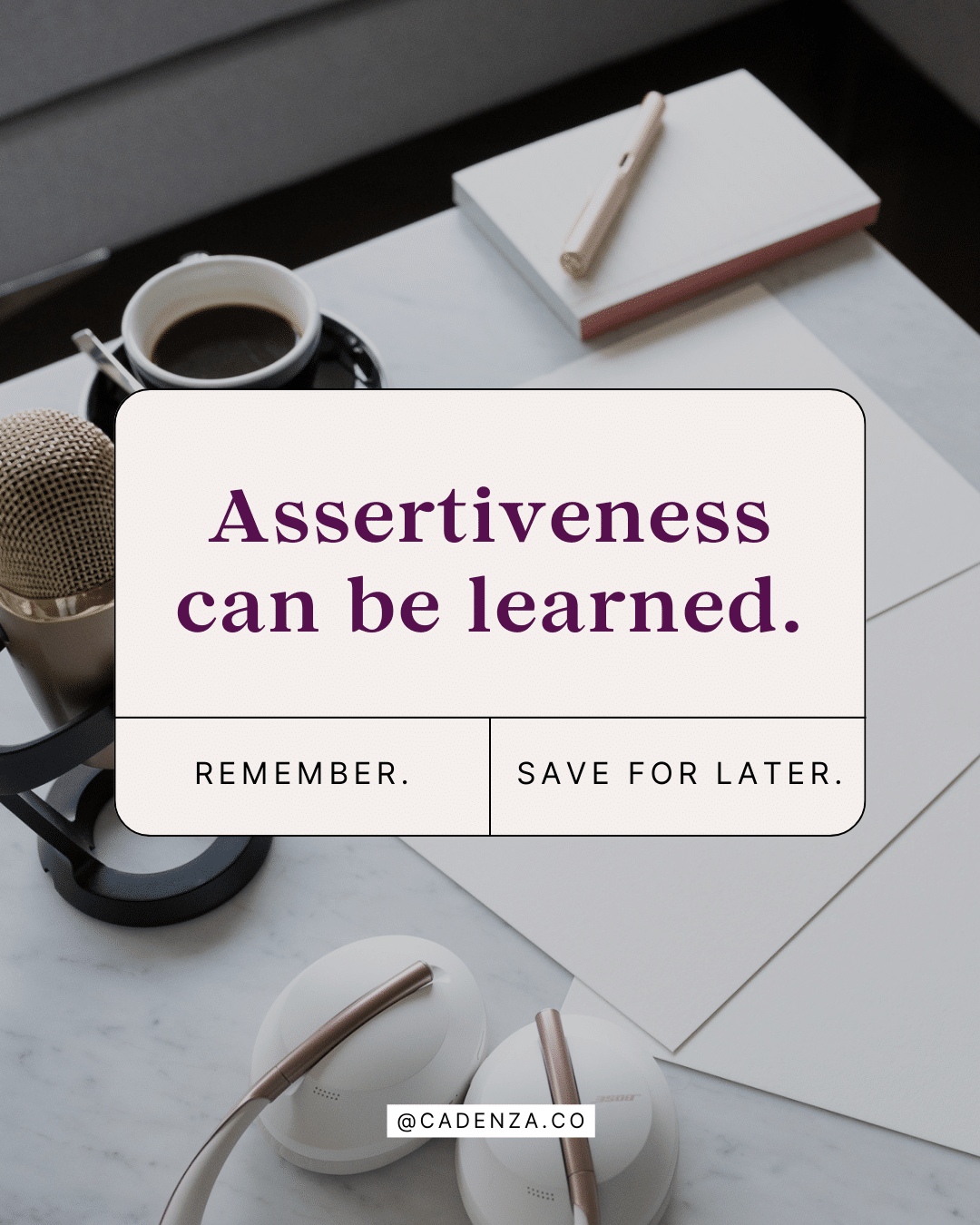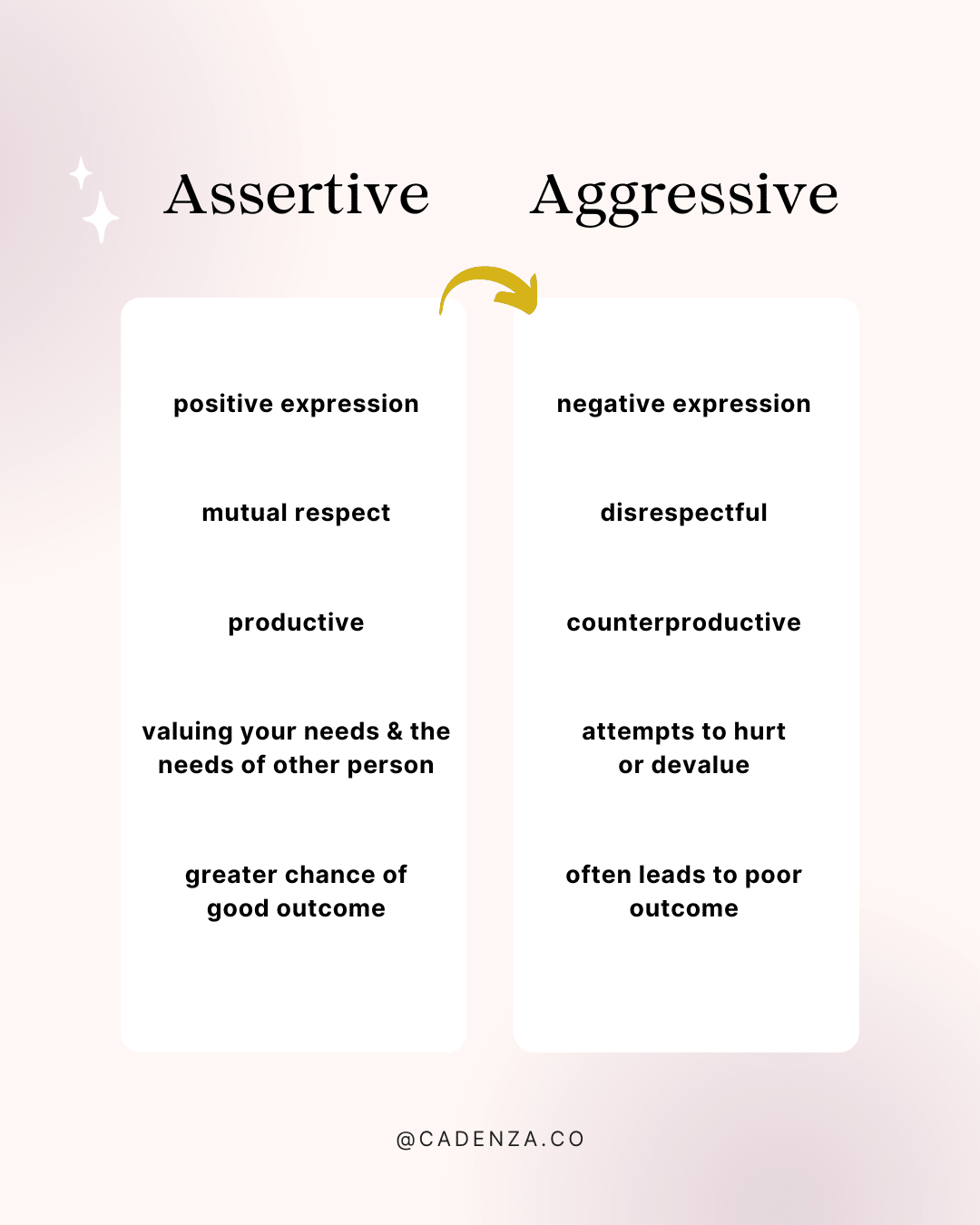Social Intelligence
How to Amplify Your Career Progress with Assertiveness

We’re not born naturally assertive. Assertive behaviour is a high-level communication skill that we need to learn and practice just like public speaking, writing persuasively, or chairing team meetings.
We can learn to develop our communication style for it to be healthier and more effective.
This blog post will train you to consider your communication position so that you can be assertive without being agressive and finally feel more comfortable about speaking up when you need to.
Assertive behaviour can be learned and I'll show you how to do it.
Being assertive can be daunting, not only in the workplace but also in low key settings.
There’s always an element of risk when you need to be assertive. Stating your needs can come across as abrupt and rude but on the flip side, if you always avoid it you’ll appear meek and can start to lack confidence.
Take, for example, a client who asks a tricky question, and we need a valid answer fast. Or maybe a fellow workmate makes unreasonable or unfair demands, whatever it is- impactful speaking forms the kinds of good impressions you need to get ahead at work. So what can we do outside of the workplace to be ready for difficult conversations?
Assertiveness is a requirement of Leadership Development
This blog is best digested in 3 steps. First, we need to clarify assertive behaviour. Then, we’ll cover 5 assertive behaviours you need to integrate to master the skill and finally we’ll wrap it up with a quick video tutorial, so stay tuned.
You might want to bookmark this page to refer back to later – because it could take more than one sitting!
Here are the steps for you to get a stronger grasp on ingredients your communication needs so that you can showcase your Assertiveness
- Read the 5 tactics below (below)
- Watch How to be assertive without being aggressive at work?
- Pick up a copy of the Communication Growth Plan for Work and review areas that you can expand to extend your professional speaking skills.
- If you like what you’ve learned, join the C-Suite Waitlist or reach out to me directly for executive coaching sessions or book me as a Speaker for your next event or team training.
Now, what is ASSERTIVENESS?
There are many different dictionary entries for the term assertive.
My preferred definition, which you can find in Collin’s dictionary:
“someone who is assertive states their needs and opinions clearly, so that people take notice.”
Interestingly, the Collins dictionary leaves out “not being frightened.” I would argue that being assertive does not negate fear; it’s very typical to feel worried, anxious, and fearful when we’re being assertive.
Get clear on assertiveness, choose a realistic definition, and don’t be too hard on yourself while you work at integrating this new skill into your communication.
We can learn to develop our communication style for it to be healthier and more effective.
Importantly, assertiveness is not about conveying a passive or aggressive communication style.
Practising assertiveness should result in your ability to respond with a calm and positive tone of voice while advocating for your rights, needs and boundaries.
Here are some tips on how to develop assertive behaviour:

#1 Shift your Mindset
Aligning your mindset is always the first step toward developing a new habit or skill. Reflect on what limiting beliefs you have that might be contributing to you not speaking up and being assertive. The most common limiting beliefs in the realm of being assertive revolve around the thought of people not liking us when we speak up. Observe these thoughts that you have rolling around in your mind and shift them into a more constructive ones. One important aspect of assertiveness is that you can be assertive without being aggressive. Gaining conflict de-escalation and emotional intelligence tactics can allow you to participate and state your needs instead of avoiding the conversation or using a passive response.
#2 Assertiveness is not your temperament
Assertiveness is a skill that you use selectively and with thought. Effective mastery involves you knowing when to enact assertiveness so that it supports your needs and position while maximising unity and rapport with your conversation partner as best as possible elsewhere. This is a tactic to use in conversations, not a passive behaviour that occurs as a result of our personality style. When you acknowledge this, you’ll start to feel more motivated to learn to be assertive!

#3 Use body language
Being assertive starts before you even say anything because communication isn’t just verbal. Practice good posture and positive facial expressions to show how engaged you are. Assertive people keep it as authentic as possible without feeling guilty for sharing their needs, concerns and non-negotiables. Avoid using an aggressive response with your voice tone and body language, focus instead on moving calmly and expansively. Strive to maintain regular eye contact with your conversation partner that is warm and open, rather than intense or demeaning.
#4 Watch your tone
Assertive behaviour is about sharing your opinion and your needs with clarity, not intimidating, sidelining, manipulating, and making others feel threatened. So, we see the difference between assertive communication and aggressive communication.

#5 Assertive behaviour should not distance you from the other person
Assertiveness should invite the other person to consider your needs, opinion, and perspective. Being assertive is not about alienating yourself from the other person with aggressive behaviour but sharing your opinion and point of view. In fact, if you’re a CEO or a leader who is worried that being assertive with your employees will distance them from you, stop right there! Being assertive with your team may result in your employees going above and beyond what you expect from them. It was found that assertive communication had a positive impact on organisational citizenship behaviour (Men, 2021). If you’re a leader, don’t shy away from being assertive. It has proven benefits for your staff, provided you know how to use this critical skill correctly.

Assertive behaviour can be learnt, but to progress you must deploy science backed techniques.
This necessary skill will lift the game for your speaking confidence:
“Being assertive shows that you respect yourself because you’re willing to stand up for your interests and express your thoughts and feelings. It also demonstrates that you’re aware of others’ rights and willing to work on resolving conflicts (Mayo Clinic).”
I hope these 5 tips will help you with an overview of assertiveness and importantly made you feel less pressure about suddenly transforming yourself into an assertive person, whatever that looks like!
Remember, this is a communication behaviour and skill that you use selectively and something that everyone needs to learn. Assertive communication gives you the ability to express your view respectfully, rather than retreating and opting out. It enables you to retain your impact tactfully, where passive communication works against your influence and visibility.
Want to learn more career skills to amplify your success? The C-Suite – A comprehensive communication program for your career, includes dedicated modules to assertiveness training and will equip you with everything you need to express your needs clearly and firmly without losing rapport. Join the waitlist here.
Does Your Assertiveness need work?
Everyone can improve their communication, even strong communicators.
Dealing with complex conversations, difficult colleagues, stressful meetings or important presentations doesn’t have to feel impossible.
If you’d like to get more tools for your career based communication so that you can increase your leadership potential and interact with precision and impact, head to my Youtube channel dedicated to sharing tactics for your speaking skills.
The Ultimate Interpersonal Skills Playlist
There’s a process behind building effective relationships with our team, boss and stakeholders at work.
If you need some inspiration or a PEP TALK for your speaking- check out this playlist.
Did you enjoy this post? Make sure to subscribe to our YouTube channel to get more content to increase your communication skills!
References
- Mayo Clinic. Being Assertive: reduce stress, communicate better. Mayo Clinic.
- More on about organisational citizenship behaviour here.
About the Author
Dr Sarah Lobegeiger de Rodriguez is a Keynote Speaker, Executive Speaking Coach, and Opera Singer who likes to play with words, sounds, and your impact.
Her academic background is in Music Performance, Communication Science and Speech & Language Pathology. She assists executive communication clients all over the world as a communication consultant with strong expertise in CEO, Founder and Entrepreneur communication strategies.
Connect with Sarah on LinkedIn.
© CADENZA
Level 14, 380 St Kilda Road, Melbourne, 3004
Privacy Policy
Terms & Conditions
Position Statement on Racism
